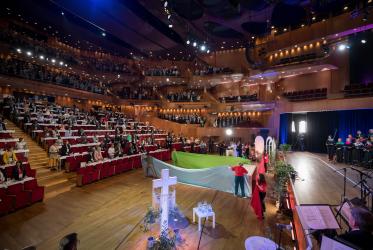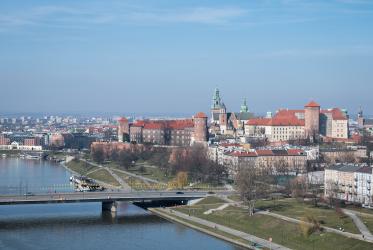Lund, Sweden, 24 March 2007
"Lord, give me the humility and wisdom to serve the great cause of the free unity of your church."
This prayer, written in 1891 by a young student whose ministry to the church universal would be marked forever by this motto through God's grace-filled response, is a most eloquent example of the vision and commitment to the unity of Christ's Church that has forged a strong relationship between the Lutheran World Federation and the World Council of Churches - a relationship characterized not only by mutual accountability and reciprocity on the journey towards unity, but by the common witness of the member churches in the service of all humanity and to the whole world.
Today, as we participate in the celebration of the 60th anniversary of the Lutheran World Federation, our thoughts turn with gratitude to the pioneers who were so inspired by Christ's prayer for the unity of his followers to have set up signs, marking the way toward greater visible unity and fellowship among Christian churches. The student pioneer who served the great cause of the free unity of [the] church' was none other than the late Archbishop Nathan Söderblom, whose memorial bust rests outside the offices of the general secretariat of the World Council of Churches as a constant reminder of the vision we have inherited.
The World Council of Churches deeply values the tireless efforts of the Lutheran World Federation to foster throughout the whole communion a Lutheran identity that is ecumenically committed and open to sharing generously its gifts of spirit and resources with the entire fellowship of churches and a broad circle of ecumenical partners.
Together, as we face the 21st century challenges to ecumenism, the World Council of Churches offers thanks to God for the continued cooperation with and commitment of the Lutheran World Federation. In particular, we count on the Lutheran family of churches to bear witness to a vision for the ecumenical movement that both re-affirms our rich history and also responds to the changing ecclesial and ecumenical contexts of our time. The support of the Lutheran World Federation for a new style of World Council assemblies that offer an expanded space in which to nurture the coherence of the ecumenical movement is one such sign of commitment and vision.
The World Council of Churches also looks forward to continued partnership and even greater collaboration in responding to the most urgent issues facing the churches today. Alongside the prayerful accompaniment and active search for visible unity, the Council looks forward to working together with the churches of the Lutheran World Federation to strengthen the ecumenical response to globalization and economic injustice, HIV/AIDS, violence and the violation of human rights.
On this festive occasion, we should look to the future with confidence, affirming the time has come for the Lutheran World Federation and the World Council of Churches to increase our common efforts to ensure the future of the ecumenical movement by making real our commitment to the formation of young adults - pastors, theologians and lay persons alike. Like Söderblom, many of the pioneer ecumenists were young student leaders. Their energy brought forth the modern ecumenical movement. The same energy is needed today to sustain the movement and to stimulate our quest for the visible unity and witness of the church. The churches are full of young people and it is our shared responsibility to nurture them in leadership for the future.
As the Lutheran World Federation celebrates 60 years of growth in communion and witness, the World Council of Churches rejoices in these achievements and looks forward to a future of even closer collaboration and common witness to the visible unity of the church.




